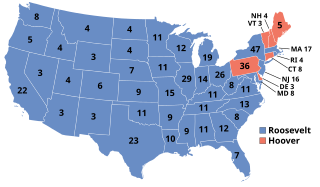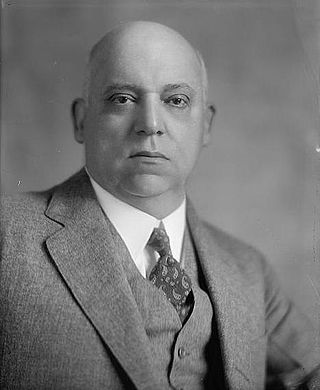
Presidential elections were held in the United States on November 8, 1932. Against the backdrop of the Great Depression, incumbent Republican President Herbert Hoover was defeated in a landslide by Democrat Franklin D. Roosevelt, the governor of New York and the vice presidential nominee of the 1920 presidential election. The election marked the effective end of the Fourth Party System, which had been dominated by Republicans, and it was the first time since 1916 that a Democrat was elected president.

Augustus Owsley Stanley I was an American politician from Kentucky. A member of the Democratic Party, he served as the 38th governor of Kentucky and also represented the state in both the U.S. House of Representatives and the U.S. Senate. From 1903 to 1915, Stanley represented Kentucky's 2nd congressional district in the House of Representatives, where he gained a reputation as a progressive reformer. Beginning in 1904, he called for an antitrust investigation of the American Tobacco Company, claiming they were a monopsony that drove down prices for the tobacco farmers of his district. As a result of his investigation, the Supreme Court of the United States ordered the breakup of the American Tobacco Company in 1911. Stanley also chaired a committee that conducted an antitrust investigation of U.S. Steel, which brought him national acclaim. Many of his ideas were incorporated into the Clayton Antitrust Act.

Edwin Porch Morrow was an American politician, who served as the 40th Governor of Kentucky from 1919 to 1923. He was the only Republican elected to this office between 1907 and 1927. He championed the typical Republican causes of his day, namely equal rights for African-Americans and the use of force to quell violence. Morrow had been schooled in his party's principles by his father, Thomas Z. Morrow, who was its candidate for governor in 1883, and his uncle, William O. Bradley, who was elected governor in 1895. Both men were founding members of the Republican Party in Kentucky.

James Dixon Black was an American attorney who was the 39th Governor of Kentucky, serving for seven months in 1919. He ascended to the office when Governor Augustus O. Stanley was elected to the U.S. Senate.

The Mississippi U.S. House elections took place on November 7, 2006. All 4 House seats for Mississippi were up for election with all incumbents running for re-election. All incumbents succeeded in being re-elected.

The 2008 congressional elections in Georgia were held on November 4, 2008, to determine who would represent the state of Georgia in the United States House of Representatives, coinciding with the presidential and senatorial elections. Representatives are elected for two-year terms; those elected will serve in the 111th Congress from January 3, 2009, until January 3, 2011.

The 2010 United States House of Representatives elections in Tennessee was held on November 2, 2010, to elect the nine U.S. representatives from the state of Tennessee, one from each of the state's nine congressional districts.

The 1904 New Jersey gubernatorial election was held on November 8, 1904. Republican nominee Edward C. Stokes defeated Democratic nominee Charles C. Black with 53.50% of the vote.

The 1974 Tennessee gubernatorial election was held on November 5, 1974, to elect the next governor of Tennessee. Incumbent Republican governor Winfield Dunn was ineligible to run for re-election, as the Constitution of Tennessee prohibited governors from serving consecutive terms at the time. Democratic nominee Ray Blanton defeated Republican opponent Lamar Alexander with 55.4% of the vote.

The 1970 Tennessee gubernatorial election was held on November 3, 1970, to elect the next governor of Tennessee. Incumbent Democratic governor Buford Ellington was term-limited and was prohibited by the Constitution of Tennessee from seeking another term. Republican nominee Winfield Dunn, defeated Democratic opponent John Jay Hooker with 52.0% of the vote.

The 1955 Kentucky gubernatorial election was held on November 7, 1955. Democratic nominee Happy Chandler defeated Republican nominee Edwin R. Denney with 58.02% of the vote.

The 1915 Kentucky gubernatorial election was held on November 2, 1915. Democratic nominee Augustus Owsley Stanley narrowly defeated Republican nominee Edwin P. Morrow by 471 votes.

The 1911 Kentucky gubernatorial election was held on November 7, 1911. Democratic nominee James B. McCreary defeated Republican nominee Edward C. O'Rear with 52.01% of the vote.

The 1948 Kansas gubernatorial election was held on November 2, 1948. Incumbent Republican Frank Carlson defeated Democratic nominee Randolph Carpenter with 57.00% of the vote.

The 1914 Nevada gubernatorial election was held on November 3, 1914. Democratic nominee Emmet D. Boyle defeated incumbent Republican Tasker Oddie with 44.65% of the vote.

The 1898 Rhode Island gubernatorial election was held on April 6, 1898. Incumbent Republican Elisha Dyer Jr. defeated Democratic nominee Daniel T. Church with 57.74% of the vote.

The 1874 Kansas gubernatorial election was held on November 3, 1874. Incumbent Republican Thomas A. Osborn defeated Democratic nominee James C. Cusey with 56.41% of the vote.

The 1924 Indiana gubernatorial election took place on November 4, 1924 under the provisions of the Constitution of Indiana. It was the 31st gubernatorial election in the State of Indiana. Republican Edward L. Jackson defeated Democrat Carleton B. McCulloch. The election took place concurrently with the 1924 United States elections that saw Republicans hold the White House and increase their majorities in both houses of Congress.

The 1904 Tennessee gubernatorial election was held on November 8, 1904. Incumbent Democratic governor James B. Frazier defeated Republican Winchester mayor Jessie M. Littleton with 55.72% of the vote.

The 1898 Tennessee gubernatorial election was held on November 8, 1898. Incumbent Democratic governor Robert Love Taylor did not seek re-election. Democratic nominee Benton McMillin defeated Republican nominee James Alexander Fowler with 57.92% of the vote.


















